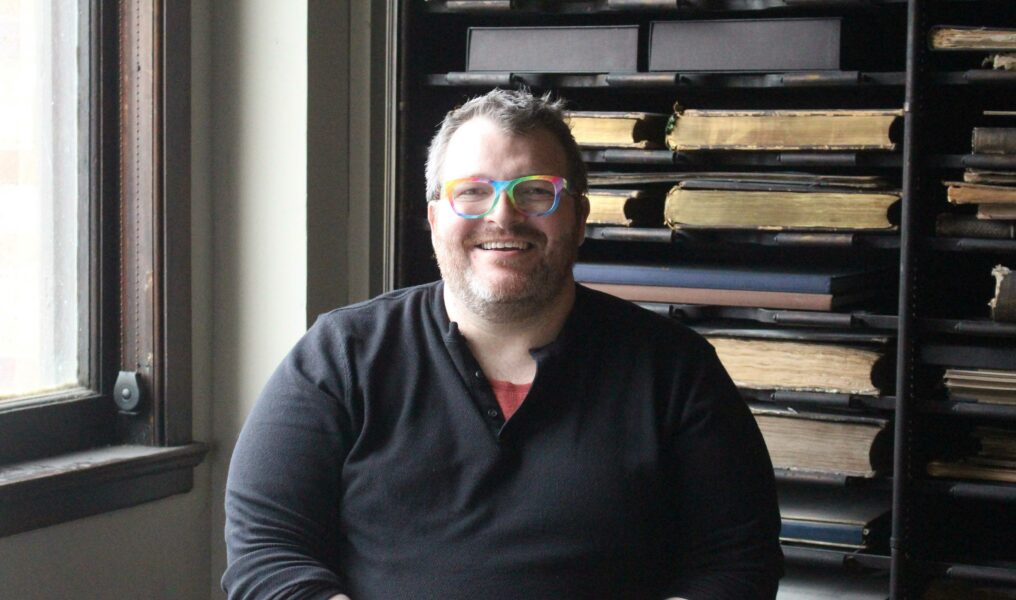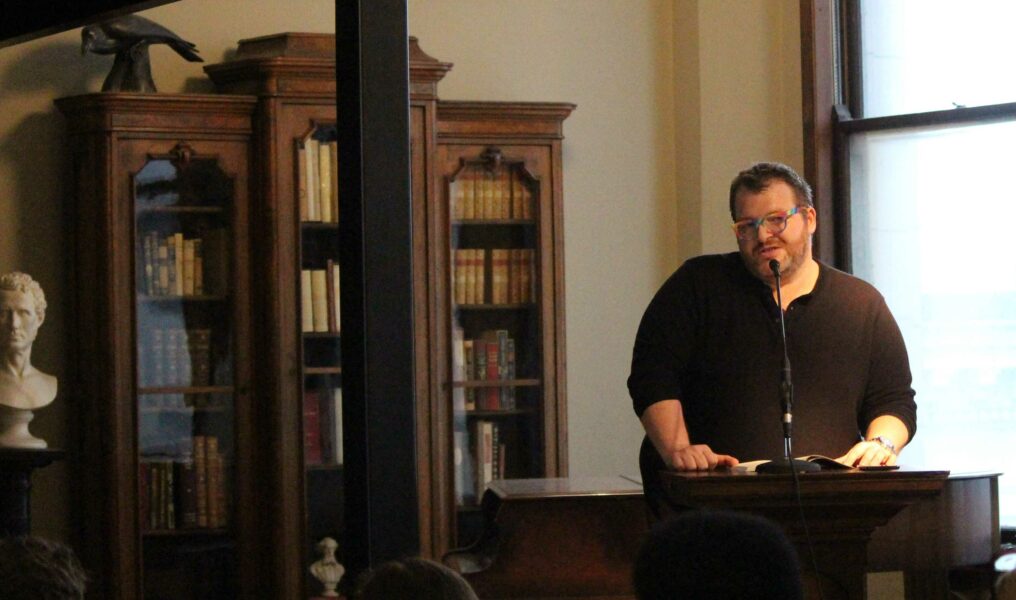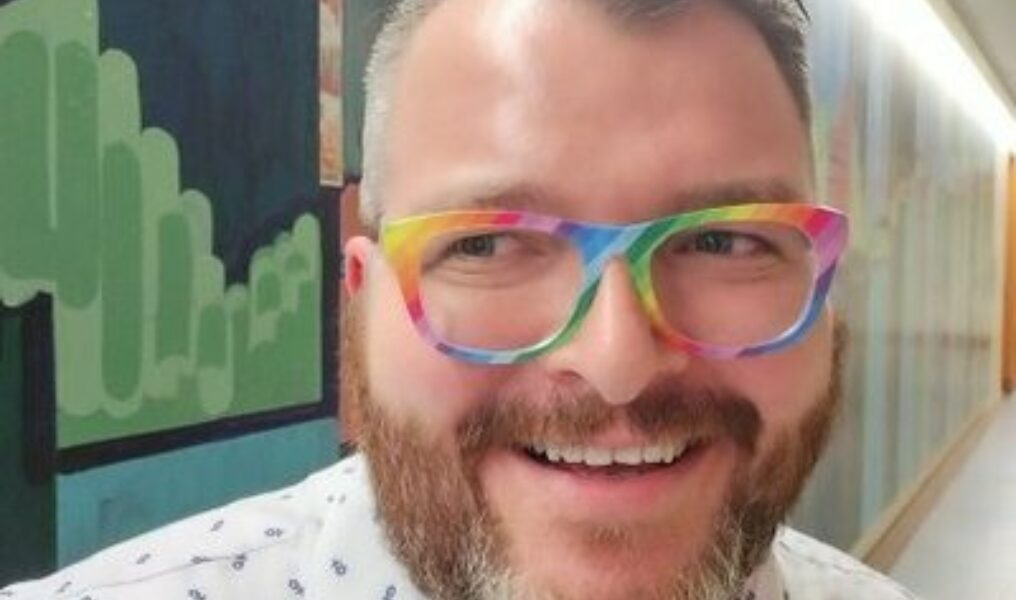His World Caught Fire, But Willie Carver Won’t Stop Advocating for Queer Students Everywhere
Kentucky Teacher of the Year and poet on why he left teaching and how we can shift the conservative narrative
When Willie Carver finished his first book of poetry, he landed on the perfect title — or so he thought. Carver’s chosen title came from an Appalachian proverb: “The Truth Will Stand When the World’s on Fire.” But while it was an apt title that called attention to the socio-political era in which we find ourselves in 2023, his publisher was drawn to one of Carver’s suggested subtitles: “Gay Poems for Red States.” The book is out now.
Ultimately, Carver concedes, his publisher was right. “First of all, the title feels political,” he tells me in a recent Zoom interview. “But you have to stop and ask yourself, ‘Why is it political? Why don’t we associate queerness with red states?’ You have the same percentage of queer people in all places. We do exist in red states.”
The reality, of course, is that while there are plenty of LGBTQ+ people living in solidly red states, many of them feel, as Carver puts it, “absolutely invisible.” “Gay Poems for Red States” is a title that speaks directly to two audiences Carver is trying to reach — queer people who he hopes feel less alone and those who need to hear his unvarnished truth about a lived experience as a queer kid growing up in Appalachia.
Carver focuses much of his tireless advocacy, which includes his participation in a long list of causes and organizations mostly focused on young queer adults, on the concepts of visibility and erasure, especially in areas where LGBTQ+ rights are constantly under attack. A couple of years ago, he bumped into a Shutterstock employee, Grete Miller, at a conference and mentioned that it was challenging to find rural queer stock photography images. “When I searched for gay images, it was usually rich white men having brunch in a cityscape,” he explains. “There are other people — we exist.”
Shutterstock took him seriously, significantly diversifying its stock image options, including its free offerings. For teachers in rural communities, Carver says, free resources are invaluable, but too often are limited to historical images, which tend to mostly feature white people (mostly men) and able-bodied children and rarely reflect the kind of diversity that exists everywhere in 2023.
Working with Shutterstock to quietly advocate in a tangible way is typical of the way Carver has been making a difference in the lives of his students since he started teaching in the early 2000s. Building a teaching career in Eastern Kentucky means teaching kids who sometimes rely on school not solely as a place to learn but as a respite from realities that are more common there than in more affluent areas.
As Carver said at a recent stop on his book tour at The Mercantile Library in Cincinnati, “There’s always water at school. There’s always electricity and something to eat.” And for kids in Carver’s classroom, there was always an advocate at the front of the room who grew up in the same circumstances — someone who didn’t really think of himself as living in poverty, but who grew up shaped by the experience of frequently going without, nonetheless.
Carver was teaching French and English in Kentucky’s Montgomery County Schools in the small town of Mt. Sterling when a few of his students nominated him for 2022 Kentucky Teacher of the Year, a designation granted by the Kentucky Department of Education. “I was quite sure I wasn’t going to win,” he remembers. “But in time, I realized how important it was that I made it as far as I could — not for me but for that queer kid I once was and for the ones who are still there.”
Months went by as the list of nominations shrunk. And then, Carver did win. That’s when his world caught fire.
It’s not that Carver expected his local district to suddenly change course when it came to how they’d approach the taboo subject of his gayness. After all, early in his career, Carver says he was told by an administrator, “No one will protect you, including me.” So it wasn’t shocking when the administration was wholly unresponsive to a dramatic uptick in threatening behavior by members of the community who were appalled by Carver’s existence as an out teacher, the nomination and, eventually, his win.
For a while, Carver fought back hard, calling out the onslaught of personal attacks, which included entirely baseless allegations about his behavior with students. There came a point when he no longer felt safe, not at home and not at school — still, he felt a responsibility to stand tall in the face of ongoing attacks. The kids needed him. Soon, though, the detractors amped up their attacks in a way Carver couldn't abide: by attacking the kids themselves.
When the world’s on fire, maybe the best strategy is to try to shift the flames away from the most vulnerable, to give the people with the fire hoses somewhere else to aim. And so, Carver resigned for a second time from the district where he was never supported by the administration but where he’d spent years of his life championing kids who needed a champion, anyway.
The first time Carver walked away from Montgomery County, in 2011, to escape what he terms “extreme homophobia,” he fled with his husband, Josh Taylor, to a dramatically more progressive community in Vermont. “We had maybe $200 in the bank,” Carver recalls. “No savings. We just got in the car and drove, found an apartment and said ‘Well, we have to land on our feet because there’s no other option.’ And we did.”
Vermont, though, wasn’t Carver’s calling. He missed Kentucky. He missed his students, and he knew he was needed. The district hired him back and he went on to spend almost a decade working under a new, better administration. “For a while, it was really nice. And then, it wasn’t.”
This time, it wasn’t just the administration, though instead of the hero’s welcome one might expect after bringing home a coveted statewide teaching award, the higher-ups were mostly silent — the district didn’t even mention that Carver had met President Biden as a result of winning the award. This time, it was 2022 and somehow, extremist rhetoric had wormed its way into mainstream Republican messaging, especially a narrative focused on “the children.”
Picking up where Anita Bryant and her Save Our Children movement left off in the ’70s, the modern anti-LGBTQ+ movement has been focused on unsubstantiated links between the LGBTQ+ community at large and child harm. Local (and frequently, activists from far away places) began showing up at school board meetings to rail against Carver — he cites his breaking point as the time a woman incessantly accused him of “grooming” students at one of the meetings as members of the administration remained silent.
There are benefits to school board meetings when it comes to community debate: They are structured and follow an inherent semblance of order. The Wild West of social media land is another story. Soon, the fire spread to places like Facebook, where community members left behind any pretense of politeness or respect. A member began posting images of Carver and LGBTQ+ students there, boldly captioned with homophobic comments and slurs. Carver asked for help; supportive parents did, too. But as always, the administration refused to intervene. “Call the cops,” they told him.
“And that was that,” Carver says. Once again, he found himself turning in his resignation. Packing up his carefully decorated classroom. Disappointing students who, on one hand, needed his guidance and advocacy and who, on the other, were being targeted by adults simply because of who he was. Who he would always be. This moment of leaving would be a true turning point, a moment when Carver’s smalltown advocacy would be amplified a thousand-fold.
Carver was invited to testify before the House Subcommittee on Civil Rights and Civil Liberties in May 2022, where he shared his experiences dealing with the district and his lifelong community, but mostly, where he advocated on behalf of queer students everywhere.
“Inclusive teachers are thrown under the bus by the people driving it,” he testified. “Forty-five percent of LGBTQ youth seriously considered suicide this year. We chip away at their dignity and spaces to exist. The systems meant to protect them won’t even acknowledge them.”
Today, Carver is still working in education as an advisor at the University of Kentucky and serving as an advocate for LGBTQ+ youth with national and state level organizations like the Kentucky Youth Law Project, Progress Kentucky, and the American Federation of Teachers LGBTQ Task Force. “I think where there’s children involved, and you are privileged enough to know the seriousness, it’s hard not to move,” he says. “I don’t think any human being would watch a child on the edge of a cliff and not run to protect them.”
Carver spends a lot of his time trying to protect students from harmful administrative decisions. “A good example is what’s happening in Boone County, Kentucky,” he says. “I’ve heard from five or six different people working in the district that they’re going to forcibly out students and not allow the students to know that if they share this information with teachers, they’ll be outed. The goal is sort of entrapment.”
Carver knows all too well what can happen when students are outed to unsupportive parents. He’s worked with many students whose parents would have made them homeless, or worse, had they found out. It’s hard enough for LGBTQ+ youth to handle the emotional toll of merely existing in the current socio-political climate. During his Congressional testimony, he spoke of one student, Meryl, a “gentle trans girl from Owen County High,” who died by suicide in 2020. “She always wanted a GSA,” he testified. “Her friends tried to establish one, but the teachers who wanted to help were afraid to sponsor it.”
Carver says he thinks a lot of people would be responding differently if they actually knew what was happening. “My goal is to have other people understand — to tell the stories they need to hear so they can see the real situation,” he says. “We have to speak to the prejudice in a positive way and counter it, truthfully, without referencing it. We have to tell the sad stories and the scary stories. What LGBTQ youth need is not the same as what the people around them need.”
“Those youth need inspiration and hope and the ability to imagine a better world. And the adults who are taking care of them need to know the seriousness of the situation.”
“Take it from a fat, gay, weird sissy from up the holler,” he writes in the poem “Promise:”
sometimes you gotta cry
and let the moon pull
the pain-polluted tide out of your body
onto the shores of your face so your oceans can be pure again;
sometimes you gotta cuss,
gotta hurl hot, raging high-voltage divinations into the air
so they can turn tables and set fire to the hills
to clear a path for you to keep going;
sometimes you gotta mourn
and gather together enough time and space to create gravity
that wraps its roots deep and intimately around a moment
so you can be sure of what was real;
so you go ahead and cry, cuss, and mourn,
but keep your head pointed towards the sky
because this moment will not be the end of you.













